 [1]
[1]
By John Helmer, Moscow
@bears_with [2]
The Palestinian strategy against Israel is aimed at destroying Israel’s capacity to survive in its present state in a long war.
This means attacking the invincibility of the Israel Defense Forces (IDF) and their so-called Iron Dome defence; this began with the cross-border offensive on October 7, and continues with daily drone and artillery attacks on targets inside Israel, as well as resistance to IDF incursions in Gaza.
The plan also means exposing the weakness of the state’s infrastructure and economy; extending the battlefield across all of Israel’s territory – the ports, power plants and electricity grid, communications, and financial markets — making the cost of occupation of the Arab territories unendurable. In a long war, two of Israel’s leading exports earning more than 40% of the state’s trade — diamonds and tourism — face ruin.*
“The Israelis cannot withstand one year of fighting in a war,” Iraq’s President Saddam Hussein told his general staff in 1983 during a discussion of planning for a regional war of the Arabs against Israel.** In the forty years since then, the evolution of military technology and tactics has expanded the power of small national liberation armies like Hamas, Hezbollah, and the Houthis, of proxy principals like Iran, and of the strategic balancing role of Russia and China. Their combination now has shortened the Zionist state’s endurance in a long war, and that of its proxy principal, the US.
The Israelis and the Jewish diaspora comprehend this reluctantly. For them, the short war must be correspondingly shorter. This means the genocide of at least a million Palestinians in lives and displacement.
The war to do that has now become an international war – and this is a war the US cannot sustain. As a Pentagon insider said [3] publicly this week, “because there are so many draws on the logistics and support infrastructure of the Pentagon, we’re not prepared to go in in a concerted way. What we are seeing right now is death by a thousand cuts. Our adversaries know we are stretched so they are going to make us stretch even more, so we can respond even less.”
The Russian Foreign Ministry spokesman, Maria Zakharova, acknowledged the point in Moscow on Thursday: US naval, air force, and marine reinforcements deployed around Israel and Gaza are “American tactics to strengthen their own security (this is how it should be interpreted) at someone else’s expense.” They are backfiring on Washington’s capacity to defend US forces in the Mediterranean, the Red Sea, the Persian Gulf, and in land bases in Syria, Iraq and Jordan. “On the contrary,” Zakharova added [4], the US military deployment “will further rock the situation in the Middle East, create additional tension that can spill out beyond the region.”
Zakharova’s warning came in the Moscow afternoon. By then Russian Foreign Ministry officials had held meetings with a Hamas delegation, and officials from Iran, Egypt, and Kuwait. Across the city at the same time, President Vladimir Putin held telephone talks with Turkey’s President Recep Tayyip Erdogan. The Kremlin communiqué reported [5]: “Russia and Turkiye have practically overlapping positions.”
Israeli and US-led media censorship and propaganda are concealing the breadth of impact of the Palestine warfighting plan, and the deepening military and economic weaknesses of the Israeli state.
The longer the war continues, the plainer the evidence is on the battlefield that the single-state scheme of Israel and the US is no longer possible. Whether Israel and the US can be compelled to withdraw to the 1967 borders and a new Palestinian state created with partition, demilitarisation, and international security guarantees – the basis of the Russian position announced again on Thursday in Moscow — remains to be fought over.
In this long war, the gods do not favour the Chosen People. [6]
Following [7] with precision the battlefield action is impossible in the Israeli and Anglo-American press. Reporting of operations, and of Israeli and US casualties, is being suppressed entirely or delayed for days, if not weeks.
 [8]
[8]According to this NBC television report [7], broadcast on October 24, there were at least 24 US combat casualties following drone attacks on or about October 18 at the Al-Tanf base in Syria and the Al-Asad base in Iraq. Reporting of naval action in the Red Sea, when the USS Carney reportedly engaged Houthi missiles over several hours, has been changing since the initial news flashes of October 19. Read more here [9]. In a new report of October 24, Israeli and US casualties in a joint raid inside Gaza were revealed [10]: “in the last 24 hours or so, some of our Special Ops forces and Israeli Special Ops forces went into Gaza to reconnoiter, to plan for where they might want to go to free hostages and make an impact, and they were shot to pieces and took heavy losses, as I understand it. I think that is where we are headed and I don't see that as a win for Israel in any way, shape, or form. And I certainly think it is very dangerous for us”. In current reporting by Al Mayadeen, daily strikes against US bases in Iraq and northeastern Syria are documented [11].
Tracking the electric war and infrastructure strikes by Hamas and Hezbollah is also difficult. They commenced [12] with cyber attacks on Israel’s electricity generation plants and power grids; these have been followed by missile and drone strikes [13]. “The ground has been laid for attacks on the Israeli grid,” a US military source claims. “I believe drones will come first, then missiles. We may even see commando raids.”
Israel’s seaports are also under constant attack. Ashkelon, which is closest in range to Gaza, has been closed. Eilat may have been the target of the Houthi missile strike which was engaged last week by the USS Carney. Ashdod, which accounts for about 40% of incoming and outgoing Israeli seaborne trade, and Tel Aviv port have been targeted [14]. The result is a tenfold surge in war risk insurance for vessels and cargoes, and the curtailment of international vessel movement in and out of the Israeli ports; there are reports [15] that shipping is down 30% in Ashdod compared to the pre-war volume. Evergreen, the Taiwanese container shipping company, declared force majeure for Ashdod on October 17 [16], diverted one vessel to Haifa, and halted future shipping into both ports. “We advise evaluating each port visit in Israel on a case by case basis and implementing appropriate precautions in ship contingency plans,” recommends [17] a maritime industry alert bulletin.
Chevron’s offshore Tamar gas field has been shut down [18]. The source produces 70% of the gas required to fuel Israel’s electricity generation needs [19]. Not a single Anglo-American media source has noticed that Israel is at risk of losing its principal energy source to drone or missile attack. “After what the Americans and Germans did to blow up the Nordstream pipelines,” comments a Moscow industry source, “what is holding Hamas back from hitting Tamar, or Hezbollah from the other Israeli gas fields?”
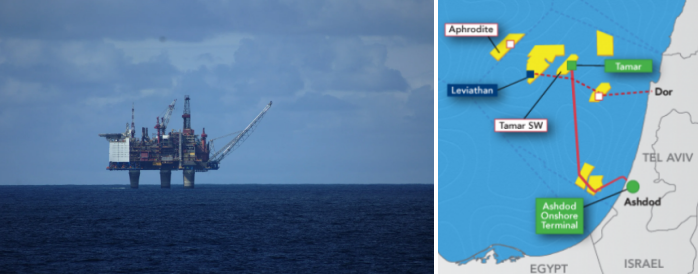 [20]
[20]Left: Chevron’s Tamar gas production platform [21] is located at sea 24 kilometres west of Ashkelon. Right: click to enlarge [22] map of Israel’s offshore gas sources.
A Moscow source comments that “in Israel, the US and the UK will be able to bring in supplies without a very big risk of US ships being attacked. The risk is to the ports and bases, not to supplies from the Med[iterranean]. The Greek and Cyprus bases will come in very useful. Israel will not face severe logistical issues as long as it is on the offensive. If its settlements start getting cut off, encircled or penetrated then it is a different matter.”
The indirect economic impacts of the war have also not been calculated or discussed in the mainstream media or international business newspapers. The leading export revenue earners are diamonds at above $9 billion per annum, and tourism which had been peaking at $8.5 billion in 2019. Counted together, diamonds and tourism amount to more than 40% of the state’s export earnings.
The Covid-19 pandemic and worldwide travel restrictions cut Israel’s tourism revenue fourfold, and this had been recovering over 2022 and the tourist season this year. This has now stopped, although for the time being Hamas rocket launches on Ben Gurion airport near Tel Aviv have been intercepted.
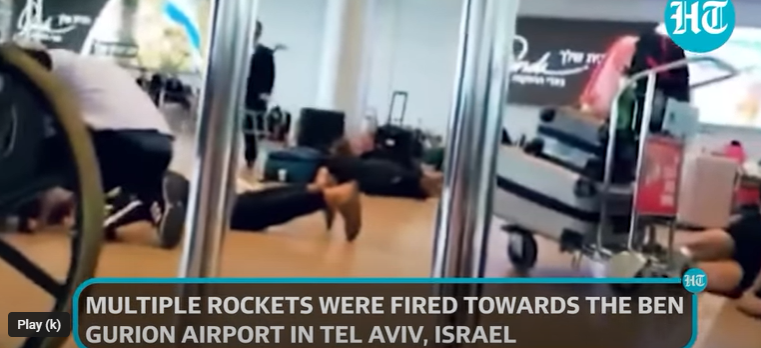 [23]
[23]October 12, 2023 -- source: https://www.youtube.com/ [24].
ISRAEL TOURISM REVENUE TRAJECTORY, 1999-2022
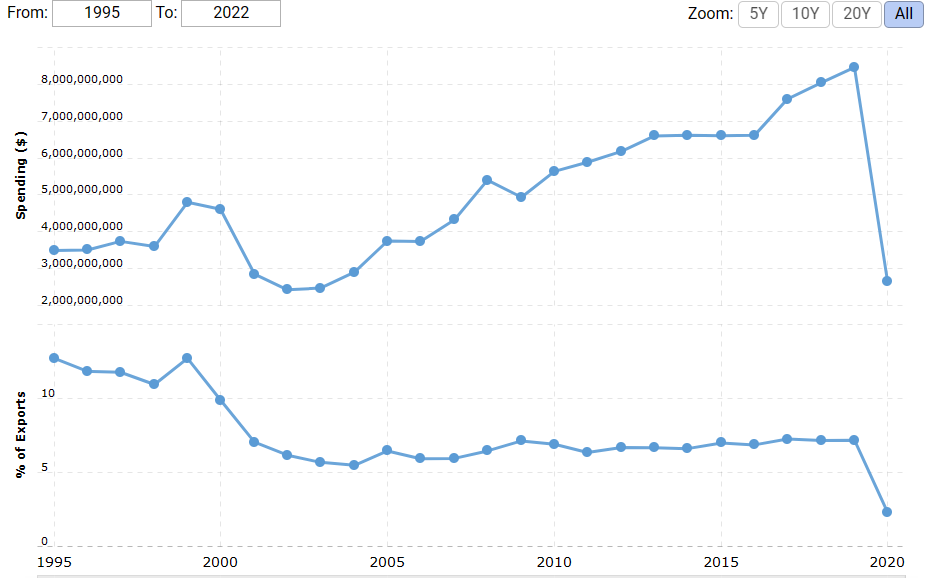 [25]
[25]Source: https://www.macrotrends.net/ [26]
Israel’s high-tech machine exports and pharmaceuticals may also be affected if electricity supply, internet networks, and transportation are damaged.
The cumulative effect will be the outcome which the international ratings agencies have been warning the international banks and financial markets to prepare for. “In our view,” Fitch reported to clients on October 17 [27], “the combination of Israel’s dynamic, high-value added economy, the record of resilience to regional conflict, [and] preparedness for military confrontations…make it unlikely a relatively short conflict largely confined to Gaza will affect Israel’s rating…. the risk that other actors hostile to Israel, such as Iran and Hezbollah, could join the conflict at scale has risen significantly…a major escalation could result in negative rating action. This could take the form of a wider and longer conflict, resulting in a sustained fiscal drain, both from higher spending and lower tax collection, as well as loss of human and material capital and severe economic disruption.”
How short, and also how long, Israel’s warfighting plan will take depends on American and international acceptance, not only of the genocide intended for the Palestinians of Gaza, but of the Novichok-type chemical warfare planned by the IDF and the Pentagon for the Hamas tunnel system in Gaza City. After several years in which the US and UK have fabricated claims that Syria and Russia were using prohibited gas warfare weapons, the Israelis have reportedly persuaded the US to participate in the tunnel attack operation [28]. The Pentagon is denying the reports.
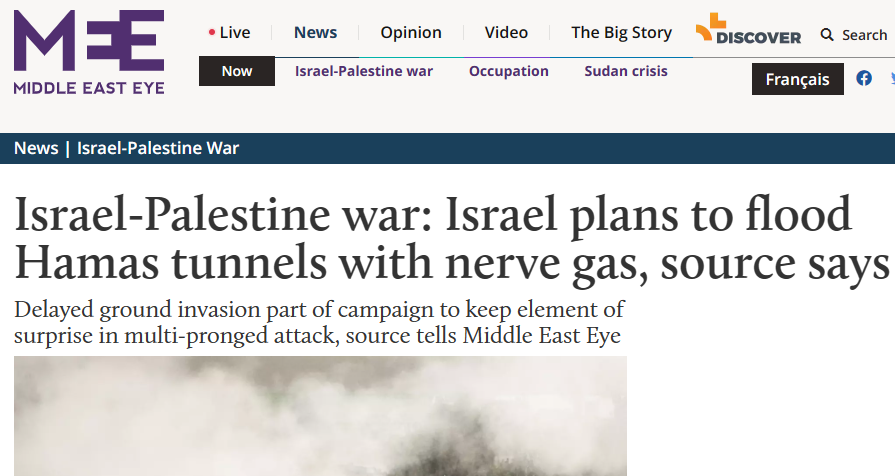 [29]
[29]Source: https://www.middleeasteye.net [28]
Russian and US military sources are already confirming the logistical supply problems facing Israeli and US forces at present, when the war is just three weeks long. Greek sources are reporting the Souda Bay, Crete, base has already reached its capacity for incoming US navy and air force supply and support operations; the spillover is facing growing Greek protest at the Elefsina air base near Athens [30].
A Cyprus source says the movement of US and British aircraft into and out of the Dekhelia and Akrotiri airbases is accelerating, and there is an air and seaborne shuttle between the Cypriot ports of Larnaca and Limassol and the USS Gerald Ford carrier group at sea to the southwest of the island.
The lengthening of the supply lines required to support the USS Eisenhower carrier group in the Red Sea and Persian Gulf and the shore bases needed to support it are politically sensitive already; and the risks of Houthi and other attacks, along with domestic Arab crowd protests, will intensify for these bases in the Arab sheikhdoms the longer the war against Israel reveals Arab and Iranian warfighting skill and resistance.
Converting these gains into a negotiating framework for Israeli-American retreat is the task Russian officials are attempting in silent coordination with the Chinese, and in semi-open negotiations in Moscow this week. In its first move outside the region since the war began, Hamas has visited Moscow for negotiations, led by US-educated Moussa Mohammed Abu Marzouq [31].
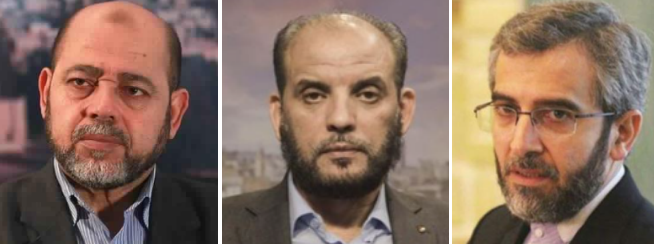 [32]
[32]Left: Moussa Mohammed Abu Marzouq; centre: Husam Badran; right, Ali Bagheri Kyani.
Zakharova confirmed [33] the start of the talks with Hamas on Thursday. She said [4]: “I can also say and confirm that representatives of the relevant Palestinian movement are in Moscow. As for contacts, we will inform you additionally.” She has also disclosed that since the war began, nine thousand Russian passport holders have returned to Russia from Israel; and that at least fifteen Russian passport holders among the Hamas hostages have been killed in the IDF airstrikes.
At the same time as Marzouq’s meetings, Husam Badran issued a statement [34] to the Russian state news medium, Sputnik. “Russia,” Badran said, “is able to play an important role in ending the war between Israel and the Gaza Strip, and delivering aid to the Palestinian exclave. Hamas values Russia’s role on the international stage, especially use of veto in the UN Security Council against the United States. But Russia can play a greater role in ending the aggression against our people in the Gaza Strip and applying international pressure to deliver urgent aid to our people in the Gaza Strip.”
What Hamas means by “greater role” for Russia has not been disclosed publicly yet. It is known that Hamas is willing to negotiate [34] the release of “non-military” hostages, including Israelis holding Russian passports, through Iran. This is conditional on the IDF lifting its siege on Gaza and allowing sufficient supplies into all parts of the territory.
The “military hostages” are being held in exchange for the release of Palestinian prisoners in Israeli jails. There are more than 6,000 of the latter; there may be fewer than 200 hostages in Gaza, as up to 50 have been killed by Israeli bombing.
The Russian Foreign Ministry statement on the talks with Hamas is less revealing. According to the Sputnik release [34], “Russia has discussed release of hostages and evacuation of Russians from the Gaza Strip during a meeting with a delegation of Hamas in Moscow on Thursday.” A member of the political office of the Islamic resistance movement Hamas, Abu Marzouq, is in Moscow. Contacts took place with him in continuation of the Russian line for the immediate release of foreign hostages located in the Gaza Strip, and issues related to ensuring the evacuation of Russian and other foreign citizens from the territory of the Palestinian enclave were also discussed.”
At the same time on Thursday – unnoticed and unreported by the western media – Russian officials held several negotiating sessions with an Iranian emissary, Deputy Foreign Minister Ali Bagheri Kyani. In three separate Foreign Ministry releases, meeting communiqués were issued for Kyani’s meetings with deputy ministers Mikhail Bogdanov [35], Sergei Ryabkov [35], and Mikhail Galuzin [36]. “The need for the cessation of hostilities in and around the Gaza Strip and the prompt provision of humanitarian assistance to the affected Palestinian population was confirmed,” Bogdanov’s communiqué said. “It was stated that Moscow and Tehran are determined to continue close coordination of efforts in the interests of stabilizing the situation in the Middle East.”
It is unclear if the talks also included the Hamas officials in a three-party format. During the day there were also Foreign Ministry negotiations in Moscow with Kuwaiti and Egyptian officials [37].
At the Kremlin it has been announced that President Putin spoke with Turkish President Erdogan to discuss the war. According to the Kremlin release [5], “the presidents reviewed the active efforts undertaken by Russia at the UN Security Council, as well as the corresponding political and diplomatic steps taken by Turkiye to stop the bloodshed and ensure the unimpeded delivery of humanitarian aid to those in need. It was emphasised that Russia and Turkiye have practically overlapping positions, focused on implementing the well-known two-state solution, which provides for the creation of an independent Palestine coexisting with Israel in peace and security.”
In her briefing for the press, Zakharova dismissed the US moves so far. “We do not consider the US presence in the Middle East as contributing to the stability of the situation in the region. Exactly the opposite. Washington’s earlier attempts to monopolise the Middle East settlement process, ignoring the true causes of the protracted conflict, have largely led to the current catastrophic consequences…This situation has an absolutely clear and understandable road, a ‘road map’ for settlement. It is not simple, but complex, painful, but leading to the solution of the issue, not its aggravation.”
“Of course, no air defence systems, arms supplies, materiel injections into some ‘security complexes’ will help resolve this situation. Today’s lesson must be learned. How many Americans have deployed there (their bases, experts, satellites), nothing has worked to prevent a bloody scenario, of which both Palestinians and Israelis are victims [4].”
[*] With support from Israel and influential Jewish diamantaires in New York and Tel Aviv, a scheme of sanctions is being prepared by the US Government to stop Russian rough diamonds, produced by Alrosa, from being sold into the Belgian, Israeli, and US markets. The Russian goods are to be tagged “blood diamonds” because of the war in the Ukraine. However, now that Israel is destroying the Palestinian population of Gaza, the “blood” tag can be applied to the Israeli diamond cutting industry and to the Jewish diamond trade abroad. Support for the anti-Russian sanction, and also for the IDF operations against the Palestinians can be found in Rapaport.com news reports. [38] “Rapaport stands with Israel”, the publication and its owner Martin Rapaport declared [39] on October 26, “and has undertaken all the necessary effort and costs for the October Single Stone Auction to help the Israeli market continue to conduct business as best as possible during this difficult time. Rapaport believes that continuing to do business in Israel during the war is a victory over the brutal Hamas terrorists, and will help Israel win the war.” In another editorial [40] for the diamond trade, Rapaport proposes “to boycott Iran and all other supporters of the Hamas terrorist organization.” Rapaport also cites religious authority for liquidation. “In the words of G-d (Exodus 17:14): ‘I will utterly blot out the memory of Amalek from under heaven.’May the words of G-d be done, here and now.” Quietly, Russia’s state diamond interests dictate a strategy for protecting against this double-edged Israeli policy.
[**] Saddam Hussein is quoted in the chapter on US plots against him in Iraq – see The Jackals’ Wedding: American Power, Arab Revolt [42], Ch. 6.
